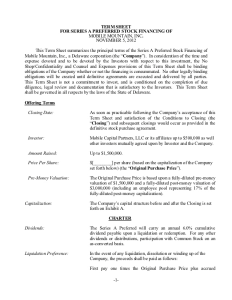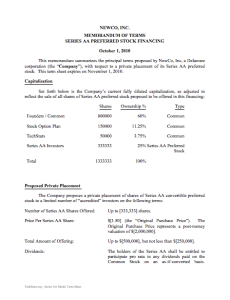
“A term sheet is like a prenuptial agreement and a coach’s playbook. Spend the time to understand the plays, and what happens should you ever separate from the business.”- Mitch Thrower
The term sheet can be defined as the summary document of key terms in contemplation of financing, according to Brad Feld and Jason Mendelson, venture capitalists and co-authors of the book Venture Deals: Be Smarter Than Your Lawyer and Venture Capitalist.
In this series, we are going to explore the contents and key terms of the term sheet, demystifying one of the most critical pieces to entrepreneurship and startup investing.
To tackle a good understanding of a term sheet, we are going to break it into parts by asking important questions, and use examples to explain the answers as simply as possible. Let’s start with a few basic questions.
What Does a Term Sheet Look Like?
To give you a visual of what a term sheet looks like, here are three front pages from actual term sheets:



Exciting, right? They are simple, black-and-white text documents with lots of bullet points containing large words juxtaposed to numbers and percentages. The average term sheet can range from 1,000 words (3-4 pages) to over 5,000 words (15-16 pages). As you can see, the word count demonstrates the range of length between term sheets, which illustrates the point that the term sheet is a highly customized document. There is no cookie-cutter, one-size-fits-all template.
Legal Documents
The National Venture Capital Association (NVCA) provides model legal documents for the venture community. The NVCA comments on the documentation procedure of the industry, writing that “the venture industry goes through an expensive and inefficient process of ‘re-inventing the flat tire’ on a daily basis.” In other words, the industry spends $200 million in direct legal fees to develop these documents from scratch for each deal every year. The point: there is no standardized “correct” term sheet; each term sheet is unique.
The complexity of the term sheet will depend on the conditions and complexity of the offering. This includes the number of investors, the presence of debt, the stage of the company, etc. Nevertheless, while deals may vary significantly, proper term sheets will contain repeated, consistent terms regardless of the deal size.
In this series, we are going to walk through a sample term sheet and explain each key term in an understandable, digestible way.
How To Handle the Legal Paperwork While Organizing A Startup.
Is the Term Sheet a Legally Binding Document?
Before we dive into an example, term sheets are not a legally binding contracts. Joshua W. Bartlett, Special Counsel, McCarter & English, LLP, explained that, with the right language in place, the term sheet is not a binding contract. He recommended using the below statement to protect both the entrepreneur and the investor parties from liability:
The parties expressly agree that no binding obligations will be created until a document entitled “final agreement of purchase and sale” is executed with the requisite formality and delivered by both parties.
Think of term sheets as similar to “letters of intent” (LOI). They are preliminary documents meant to record two or more parties’ intentions to enter into a future agreement based on specified terms.
Offering Terms
After the title, contact information, and preliminary legal stipulations, we come to the “offering terms” section of the term sheet. Think of the offering terms (a.k.a. Structure of Financing) as the money – a snapshot of how much capital is being invested in the venture.

The offering terms section contains six statements:
- Closing Date
- Investors
- Amount Raised
- Price Per Share
- Pre-Money Valuation
- Capitalization
Next Step – The Holy Grail of Entrepreneurship: The Term Sheet, Part 2 – offering terms
NOTE: This article may discuss issues for which legal advice should be considered prior to a decision or agreement with a third party. It should be noted that the author is not an attorney, and FundingSage is not a law firm. FundingSage’s employees and affiliates do not provide legal advice. We recommend you seek the services of an attorney if legal advice is required.









